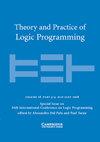Querying Data Exchange Settings Beyond Positive Queries
IF 1.1
2区 数学
Q3 COMPUTER SCIENCE, SOFTWARE ENGINEERING
引用次数: 0
Abstract
Abstract Data exchange, the problem of transferring data from a source schema to a target schema, has been studied for several years. The semantics of answering positive queries over the target schema has been defined in early work, but little attention has been paid to more general queries. A few proposals of semantics for more general queries exist but they either do not properly extend the standard semantics under positive queries, giving rise to counterintuitive answers, or they make query answering undecidable even for the most important data exchange settings, for example, with weakly-acyclic dependencies. The goal of this paper is to provide a new semantics for data exchange that is able to deal with general queries. At the same time, we want our semantics to coincide with the classical one when focusing on positive queries, and to not trade-off too much in terms of complexity of query answering. We show that query answering is undecidable in general under the new semantics, but it is $\text{co}\text{NP}\text{-complete}$ when the dependencies are weakly-acyclic. Moreover, in the latter case, we show that exact answers under our semantics can be computed by means of logic programs with choice, thus exploiting existing efficient systems. For more efficient computations, we also show that our semantics allows for the construction of a representative target instance, similar in spirit to a universal solution, that can be exploited for computing approximate answers in polynomial time.查询除正查询之外的数据交换设置
数据交换,即将数据从源模式传输到目标模式的问题,已经被研究了几年。在早期的工作中已经定义了回答目标模式上的肯定查询的语义,但是很少关注更一般的查询。存在一些针对更一般查询的语义建议,但它们要么不能适当地扩展肯定查询下的标准语义,从而产生反直觉的答案,要么即使对于最重要的数据交换设置(例如,具有弱无环依赖关系),它们也使查询回答不可确定。本文的目标是为数据交换提供一种能够处理一般查询的新语义。同时,我们希望我们的语义在关注正面查询时与经典的语义一致,并且在查询回答的复杂性方面不要做太多的权衡。我们证明了在新语义下查询应答一般是不可判定的,但当依赖关系是弱无环时,查询应答是$\text{co}\text{NP}\text{-complete}$。此外,在后一种情况下,我们表明,在我们的语义下,精确的答案可以通过具有选择的逻辑程序来计算,从而利用现有的高效系统。为了更有效的计算,我们还表明,我们的语义允许构造一个有代表性的目标实例,在精神上类似于通用解决方案,可以用于在多项式时间内计算近似答案。
本文章由计算机程序翻译,如有差异,请以英文原文为准。
求助全文
约1分钟内获得全文
求助全文
来源期刊

Theory and Practice of Logic Programming
工程技术-计算机:理论方法
CiteScore
4.50
自引率
21.40%
发文量
40
审稿时长
>12 weeks
期刊介绍:
Theory and Practice of Logic Programming emphasises both the theory and practice of logic programming. Logic programming applies to all areas of artificial intelligence and computer science and is fundamental to them. Among the topics covered are AI applications that use logic programming, logic programming methodologies, specification, analysis and verification of systems, inductive logic programming, multi-relational data mining, natural language processing, knowledge representation, non-monotonic reasoning, semantic web reasoning, databases, implementations and architectures and constraint logic programming.
 求助内容:
求助内容: 应助结果提醒方式:
应助结果提醒方式:


